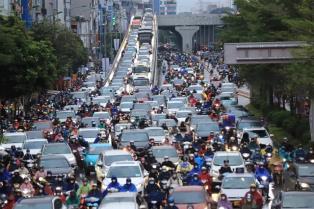Deputy Prime Minister Trinh Dinh Dung on Friday inaugurated the first made-in-Viet Nam bus factory in Quang Nam Province.

Deputy Prime Minister Trinh Dinh Dung on Friday inaugurated the first made-in-Viet Nam bus factory in Quang Nam Province
The factory is located in the central province’s Chu Lai-Truong Hai Industrial Complex and invested in by the Truong Hai Automobile Company (Thaco).
It will produce 20,000 buses and minibuses a year from 2018, mostly for export.
The VND7 trillion (more than US$300 million) factory, which covers 17ha, will supply high-quality vehicles using 60 per cent of Vietnamese-made components and engines meeting Euro 4 Emission Standards, the investor said.
Praising the initiative, Deputy PM Dung said: “The launching of the bus factory today is a significant landmark for the local automobile industry and in line with the
Government’s auto industry development strategy until 2025 with vision extended to 2035. This is the first ever Vietnamese auto brand designed for domestic use and regional export.”
Dung also welcomed the fact that a made-in-Viet Nam automobile brand is joining world value chains, saying it would boost the local auto industry, its supporting industry and related logistics industry.
He cautioned, however, that the price of locally assembled or manufactured autos is yet to be competitive in the world market, while the supporting industry growth was sluggish.

Thaco signed on Thursday a commercial deal with partners from Thailand, Chinese Taipei, the Phillipines and Cambodia for exporting more than 1,100 autos, of which 550 will be delivered next year.
Thaco Chairman Tran Ba Duong said the bus factory is the biggest in the ASEAN region, and has been built to take advantage of the zero tax that will apply in the region next year.
“The factory has been designed with environmentally-friendly technology, meeting strict export requirements, including the conveyer, robot welding, the first ASEAN electrostatic paint booths, monocoque design (seamless body and chassis), a research and development centre, and a 2.4km testing road,” Duong said.
“We have sold 14,000 29-47 seat buses from the first factory built in 2011, capturing a 54 per cent market share, while our buses with sleeper berths, branded Mobilehome, was leading the Viet Nam market with 86 per cent,” he said.
The Quang Nam-based auto maker has also developed a supporting industry zone with 24 plants producing spare parts and accessories for local use and export.
Thaco, in co-operation with Japan’s Mazda Motor Corporation, has developed a new Mazda factory – the second such Mazda facility in Quang Nam Province, with a total investment of US$380 million. Work on the factory began in 2016 and it is expected to roll out cars from next year.
Furthermore, the nation’s biggest local auto producer has invested $400 million in a complex that has a logistics centre (shipping services, etc.), a vocational training college, factories to produce seats, windscreens, chassis and other auto accessories, and storage facilities.
It sold 112,000 trucks, vans and commercial cars for revenues of $2.8 billion last year, contributing 80 per cent of the provincial budget (VND15.5 trillion) via land-rent and various taxes including income tax.
Thaco, which currently assembles and distributes South Korea’s Kia, Japan’s Mazda and France’s Peugeot models, is set to become the new official importer of BMW vehicles, including the Mini brand, in 2018. — VNS





